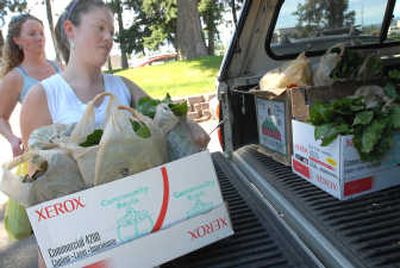Fighting against hunger

Korrine Kreilkamp is setting the stage for a grass-roots assault, and she’s looking for volunteers.
Placards have been placed around Coeur d’Alene, a phalanx of bicycles is ready to roam the streets and boxes stamped with her program’s insignia have been equipped as weapons. Kreilkamp just needs the community’s help in raising the flags of opposition against ubiquitous waste and oppressive hunger.
Earlier this year, Kreilkamp and friend Kelly Garasky formed the volunteer program, Community Roots, a grass-roots initiative with the goal of gathering excess produce from local gardeners to distribute to local food banks and soup kitchens.
With a booth at both farmers’ markets, a steady trickle of word-of-mouth marketing and a small army of on-call gleaning teams ready to gather extra backyard fruits and vegetables, the founders of the Kootenai Environmental Alliance program hope to do their part in the struggle against hunger that affects thousands of people across North Idaho.
So far, Community Roots has donated more than 100 pounds of locally grown produce to 10 food-assistance facilities.
“Basically, we started talking about local issues and national issues,” said Kreilkamp, who also is a board member of Kootenai Environmental Alliance, the group that secured Tubbs Hill as a city park for Coeur d’Alene in the ‘70s.
The Iraq war, environmental concerns, food shortages – those were some of the factors that spurred Kreilkamp’s and Garasky’s decision to become proactive with a neighbor-to-neighbor approach.
“From that, we kind of manifested this idea,” Kreilkamp said. “It not only touches on social issues, but it also touches on environmental issues.”
The program is focused solely on local needs. “This is a little part where we can help lend a hand,” Kreilkamp said. “It’s kind of a national duty, in a sense.”
Since the group went public in April on Earth Day, local businesses have joined the effort with donations.
The Kootenai Environmental Alliance provided financial support to get the program off the ground, bike carts came from Aaron and Vincent Young of Born Again Bicycles, a refrigerator from Greenstone Homes was dropped off at the Community Roots “office” in Kreilkamp’s garage and produce from several local farms is hauled in weekly by the basket load.
Gardeners are encouraged to cultivate more than they can consume. Of fresh produce, Garasky said, “It’s the thing that’s not donated most; (fresh fruits and vegetables) highly lack in donations.”
Kreilkamp and Garasky hope the program’s roots snake through as many local gardens as possible, binding them together throughout Coeur d’Alene and the surrounding area “to develop a local food system that plays a role in reducing greenhouse gases, to promote healthy eating habits for those in need of food and to establish a stronger, more sustainable community,” says a pamphlet.
“People are on board with it,” said Janet Torline, president of the Kootenai Environmental Alliance, one of the oldest conservation groups in Idaho.
Praising Kreilkamp’s homegrown idea, Torline said, “She’s just a brilliant young woman with a passion for improving the lives of others.”
Every Wednesday, a group of bicycle-riding volunteers coordinates pickup of the local produce, while a monthly booth is set up at the downtown farmers’ market to collect any of the day’s holdovers.
“We are really excited to have someone consistent” with the produce collections, said Anissa Duwaik, manager of Wednesday’s outdoor farmers’ market. “Instead of having somebody just talk about it, they are out there doing it. … I think there definitely is a trend for people getting more involved with the community.”
More than half the food-assistance services are located in or near downtown Coeur d’Alene, so that’s where most of the collecting takes place. However, Kreilkamp and Garasky hope to see the program branch out with volunteers gathering produce outside the city limits weekly and hauling in what otherwise would go to waste.
“Anyone with extra produce in their garden can just give us a call,” Kreilkamp said.
Ten food banks and soup kitchens have agreed to accept the donations. They are Lake City Community Church food bank, Children’s Village, St. Vincent de Paul Transitional Home, Idaho Youth Ranch Anchor House, Lake City Senior Center, First Presbyterian Church, St. Pius Church, the Feast at the Altar Church, Seventh-day Adventist Church and Cherished Ones Ministries soup kitchen. More are being added, Kreilkamp said.
For produce-strapped services struggling to keep up with growing demand for food assistance, Community Roots is a novel initiative.
“I think it’s a wonderful program,” said Angie Lee, food bank manager at Community Action Partnership, which serves 28,000 meals per year and distributes to 32 sites around the state.
Produce is something the food bank can constantly use, she said.
“With Coeur d’Alene growing like it’s been, we are feeding more people every day,” Lee said. “We are always in need of fresh produce.”